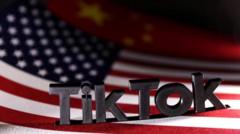In a significant meeting held at his Mar-a-Lago estate, President-elect Donald Trump is set to speak with TikTok’s CEO, Shou Zi Chew, as the company faces a looming deadline for a potential ban in the United States. A law passed recently mandates that TikTok must be sold by ByteDance, a Chinese technology firm, before January 19 or risk being banned, due in large part to concerns about national security and alleged ties to the Chinese government—claims that both TikTok and ByteDance have vigorously denied.
In response to these allegations, TikTok has initiated an emergency application to the US Supreme Court, seeking a delay in the enforcement of the ban. The company argues that it provides crucial communication avenues for millions and states that the ban would impose “immediate irreparable harm” to both its operations and its users.
Notably, Trump’s opposition to the ban diverges from his earlier position advocating restrictions during his first presidential term. He has suggested that a ban would inadvertently bolster competitors like Facebook. Interestingly, despite recent swings in voter sentiment among young Americans toward his campaign, TikTok, which has become a significant platform among the youth demographic, has reportedly played a role in this shift. Trump expressed affection for TikTok, stating, “I have a warm spot in my heart for TikTok, because I won youth by 34 points.”
TikTok’s case faced a setback earlier in the month when a federal appeals court upheld the legality of the ban, attributing it to bipartisan legislative actions spanning several administrations. As urgency mounts, Trump has committed to examining TikTok’s operations closely after his inauguration on January 20, fueling speculation about the outcome of the forthcoming discussions and the platform’s place in American digital culture.
In response to these allegations, TikTok has initiated an emergency application to the US Supreme Court, seeking a delay in the enforcement of the ban. The company argues that it provides crucial communication avenues for millions and states that the ban would impose “immediate irreparable harm” to both its operations and its users.
Notably, Trump’s opposition to the ban diverges from his earlier position advocating restrictions during his first presidential term. He has suggested that a ban would inadvertently bolster competitors like Facebook. Interestingly, despite recent swings in voter sentiment among young Americans toward his campaign, TikTok, which has become a significant platform among the youth demographic, has reportedly played a role in this shift. Trump expressed affection for TikTok, stating, “I have a warm spot in my heart for TikTok, because I won youth by 34 points.”
TikTok’s case faced a setback earlier in the month when a federal appeals court upheld the legality of the ban, attributing it to bipartisan legislative actions spanning several administrations. As urgency mounts, Trump has committed to examining TikTok’s operations closely after his inauguration on January 20, fueling speculation about the outcome of the forthcoming discussions and the platform’s place in American digital culture.





















